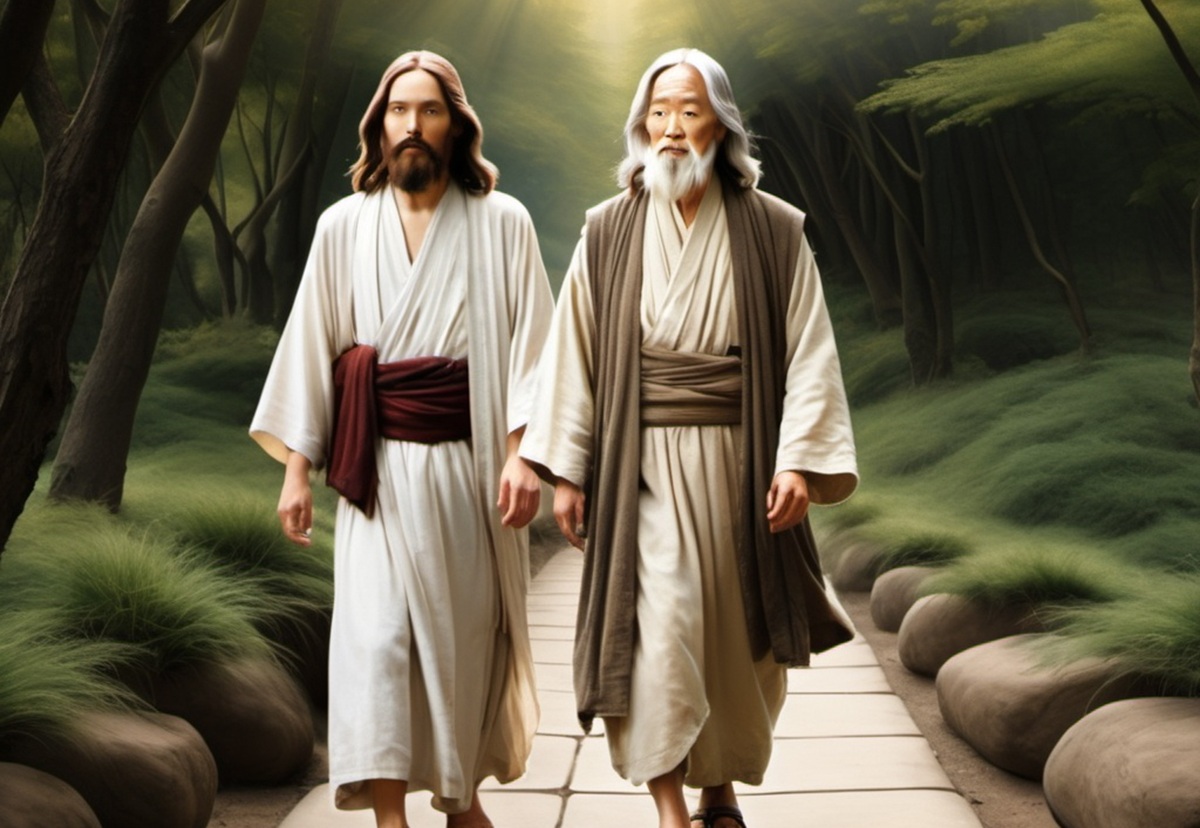Are old names for God limiting your faith? Renaming God as “The Way” and “The Tao” can open new spiritual insights.

Why Would You Want to Rename God?
Recently, I rewatched Stuart Hazeldine’s movie The Shack (2017), based on Wm. Paul Young’s novel of the same name. In this amazing story, Mack feels God has abandoned him. Because of his childhood trauma and a recent devastating loss, he misunderstands God’s nature. Instead of a loving parent, he views God as a wicked tyrant who cares nothing for the innocent while allowing the guilty to go unpunished. Through a mystical encounter, he comes to know God differently, as Papa.
Mack’s broken life shatters old paradigms for knowing God. He needs a new understanding, a new name to use if his faith is going to recover. This is true for many who, for one reason or another, the old names of God no longer work. Whether it’s because of disappointed expectations of God, theological issues, religious trauma, or anything else, renaming God may help you too.
Renaming God
In the first article of this series, I introduce the purpose of this cycle of articles, “Renaming God”:
In this new series, “Renaming God,” I will examine some of the more well-known names for God that you don’t hear everyday. I will also suggest some alternative names for God you might not have heard before. None of these names of God will be from the pantheons of polytheistic religions. Some may be names of God from other monotheistic faiths, that are compatible with the character of the Christian God. Still others will be entirely new divine names for you to consider.
Each of these articles will present two names for God. One will be a divine name that you may have heard before. The other will either be rarely used in Christian circles, or an original suggestion on my part. Today, we will look at two names that are related to one another: the Way, and The Tao.
The Way
Everyone wants to know that they’ve found a good way to live their life. But this name for God illustrates more than a mere manner of living. When we understand God as The Way, this divine path leads to eternal life.
The Way, Truth, and Life
In John 14:1-7, Jesus uses this divine name to describe himself.
“Do not let your hearts be troubled. Believe in God; believe also in me. In my Father’s house there are many dwelling places. If it were not so, would I have told you that I go to prepare a place for you? And if I go and prepare a place for you, I will come again and will take you to myself, so that where I am, there you may be also. And you know the way to the place where I am going.” Thomas said to him, “Lord, we do not know where you are going. How can we know the way?” Jesus said to him, “I am the way and the truth and the life. No one comes to the Father except through me. If you know me, you will know my Father also. From now on you do know him and have seen him.”
Many use this verse to claim the exclusivity of Jesus as the only way to God. By this, they mean that no other religion and no other religious teacher can lead a person to God. Jesus’s intent, however, is not to contrast himself with other religions. Instead, he claims to be the embodied presence of the God of the Jewish understanding. If you want to know who Jehovah is, look at Jesus. He made no claim about other religions in this statement.
Another way to understand this is to recognize Jesus as The Way of Truth, and The Way of Life. Living your life after the pattern of Jesus always leads to the truth. And Jesus doesn’t claim to just show us the way. He says he is The Way itself—another name for God.
Hebrew Bible References to The Way
Jesus was not completely original in his statement about The Way. The Hebrew Bible references this Way as well. Proverbs 3:5-6 says:
Trust in the Lord with all your heart,
and do not rely on your own insight.
In all your ways acknowledge him,
and he will make straight your paths.
God not only makes our paths straight—God is the straight path itself. In Isaiah 55:8, the prophet speaks for God, declaring:
For my thoughts are not your thoughts,
nor are your ways my ways, says the Lord.
Again, Isaiah 40:3 says:
A voice cries out:
“In the wilderness prepare the way of the Lord;
make straight in the desert a highway for our God.
God is very concerned with people following The Way, because God is The Way.
Followers of The Way
These voices pave the road for Jesus to reveal himself as The Way. Jesus’s early disciples would take these verses, and his own self-revelation to heart. So much so that Christianity was named after this life-giving Way. In Acts 9:1-2, Paul sets out to persecute Christians—but they aren’t called Christians yet. That would come later. For now, the Church was called after their special name for Jesus—The Way.
Meanwhile Saul, still breathing threats and murder against the disciples of the Lord, went to the high priest and asked him for letters to the synagogues at Damascus, so that if he found any who belonged to the Way, men or women, he might bring them bound to Jerusalem.
Acts 24:14 continues this evidence that the early Church was called The Way. Paul defends himself, saying:
But this I admit to you, that according to the Way, which they call a sect, I worship the God of our ancestors, believing everything laid down according to the law or written in the prophets.
It’s important to understand that the early Church used the term The Way, not just to refer to a path, as if they were on a path towards peace or righteousness. Instead, they understood The Way to mean Jesus himself. And they were followers of Jesus, who is called The Way.
The Tao
When early Christians journeyed to China, they encountered another religion, Taoism. If Christianity’s antecedent, Judaism, had eschewed anthropomorphic images of God, Taoism went a step further. For Chinese Taoists, Ultimate Reality could not be described in anthropomorphic language at all. The closest analogy Taoists had to God was The Tao, which meant The Way. Their sacred text, the Tao Te Ching, said:
The Tao that can be described
is not the eternal Tao.
The name that can be spoken
is not the eternal Name.
So, for Taoists, the concept of naming an almighty deity seemed problematic. Once you name the Ineffable, you begin to lose something of its greatness. So, they contented themselves with referring to The Tao, or The Way. In my article, “Is God Really Knowable? Here’s What Jesus and Lao Tzu Say…” I write:
Logos and Tao
The American Bible Society did something similar in their 1911 edition of the Canton New Testament, in which they translated “Logos” as “Tao.” Here is their rendering of John 1:1-5, 10, 14a:
In the beginning was the Tao,
And the Tao was with God,
And the Tao was God
The same was in the beginning with God.
All things were made by Him.
And without Him was not anything made that was made.
In Him was life, and the life was the light of men.
And the light shines in darkness,
And the darkness comprehended it not….
He was in the world, and the world was made by Him,
And the world knew Him not….
And the Tao became flesh,
And dwelt among us,
And we beheld His glory….
These Bible translators understood that for the Chinese people the closest word to “Logos” was “Tao.” Yet, for many Christians, this doesn’t feel right. If this seems awkward to you, don’t worry. It’s a good thing if you are uncomfortable with Christ being called the Tao. Hold onto that discomfort—because the Tao that can be named is not the eternal Tao. To name Jesus of Nazareth as the eternal Tao would be too small a thing to describe Tao. Terms like God and Holy Spirit fall short. Yet, words are what we have. The key is to remember that once we name Tao, it slips through our fingers. This is why the Hebrew tradition wisely refuses to name the Sublime.
Jesus as Tao
In this series, I suggest alternative names for God that you may not have heard before. If you are a regular reader of my blog, you will not be surprised that the first suggestion is Tao. The benefit of this word is that it does not carry the baggage of the word “God.”
Jesus chose to employ this imagery of The Way when he identified himself as divine, without using the word “God.” He said, “I am The Way.” In Taoism, the Tao represents the path of life, the flow of the universe, the truth and the life that permeates all things. Christianity has much in common with Taoism, so much that many scholars call Jesus and Lao Tzu kindred spirits. I invite you to read my series, “Jesus and Lao Tzu,” beginning with the first article.
A Nonanthropomorphic God
Too often we conceive of God as a superhuman, rather than understanding the Divine as supra-human. Using names and images of God that are not human-shaped is a good start, if you want to free yourself from limiting traditional concepts. Renaming God as The Way or The Tao can help you escape the traditional concepts of God that can so often constrain your spiritual development.
For those who feel let down by a Sky Daddy who refused to answer their prayers, the concepts of The Way and Tao can satisfy a desire to see the divine in all things, without adopting an anthropomorphic view of God. I hope you will join me on this journey of occasional articles as we explore alternative names for God you won’t have learned in Sunday school.
For related reading, check out my other articles:
- How Taoism Made Me a Better Christian
- What if the Church Valued Doubt as Much as Faith?
- What is the Christian’s Source of Ultimate Truth?

















